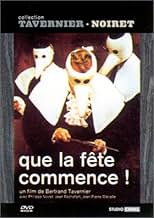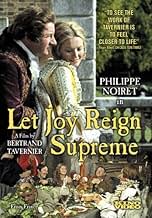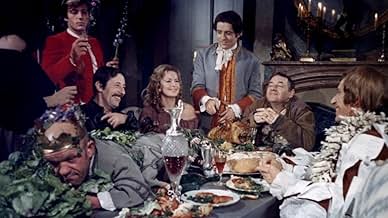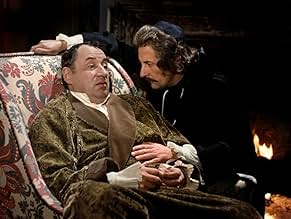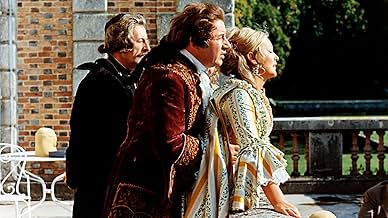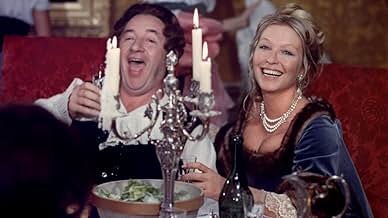Que la fête commence...
- 1975
- Tous publics
- 1h 59min
NOTE IMDb
7,0/10
1,9 k
MA NOTE
Un drame satirique inspiré de la vie de débauche de Philippe d'Orléans, Régent du Royaume de France au XVIIIe siècle, sous le regard complice d'un abbé ambitieux.Un drame satirique inspiré de la vie de débauche de Philippe d'Orléans, Régent du Royaume de France au XVIIIe siècle, sous le regard complice d'un abbé ambitieux.Un drame satirique inspiré de la vie de débauche de Philippe d'Orléans, Régent du Royaume de France au XVIIIe siècle, sous le regard complice d'un abbé ambitieux.
- Réalisation
- Scénario
- Casting principal
- Récompenses
- 5 victoires et 3 nominations au total
Avis à la une
This majestic movie reveals everything of that contrasting period after the reign of the "Roi Soleil". France was empty-blooded by the wars and de best thing the Régent of that moment could was to make peace with England. A Breton upraising supported by Spain was the worst case scenario. L'abbé Dubois is eager to become archbishop and everything he does, even the national politics is supported by his dream. We see the speculations about Missisipi and the first bank notes by the state. The Régent, Philippe Noiret, is a person who enjoys life and tries to avoid all problems. Against this, l'abbé Dubois and the nephew of the Régent seem to be the human beasts fueled by their ambition. The church is all powerful and the High Nobility without scruples. The state tries to populate la Louisiane by embarking prostitutes. The Régent seem to be the only good person of his time. This movie is a joy to watch again because of the sharp dialogue and the historical details.
This movie IT'S DEFINITELY NOT "probably the best historical movie ever" or "one of the few movies featuring 3 of the best French actors (in leading roles)",as someone SO WRONGLY says in a review!THESE ARE SIMPLY HUGE NONSENSES!First of all,this movie IT'S NOT AT ALL "probably the best historical movie ever"!To say something like this means that YOU DON'T KNOW ALMOST ANYTHING ABOUT THE HISTORICAL MOVIES!This film is pretty nice,but THERE ARE A LOT OF HISTORICAL MOVIES which are MUCH BETTER and which DEAL WITH MUCH MORE IMPORTANT HISTORICAL THEMES!Then,THIS IS CERTAINLY NOT "one of the few movies featuring 3 of the best French actors (in leading roles)"!THERE ARE A LOT OF OTHER MOVIES featuring 3 OR MORE of the best French actors in leading roles(obviously because such actors WILL ALMOST ALWAYS HAVE THE LEADING ROLES)!So,some people SHOULD REALLY STOP WRITING all kind of BIG NONSENSES like this in here!
well, the film directed by auteur Bertrand Tavernier did win 3 awards at cesar, Tavernier who a former assistant to french crime master Jean Pierre Melville who died 2 years before the cesar award came out(1975)(so obviously unable to make his name into the cesar history) now could be touched in his grave since his prestigious student did it for him or in his name
well, the man who directed this decent film----Bertrand Tavernier, suddenly became a director after his master's death in 1973 and who I admit is a good director all the way , deserves his wins , but that doesn't mean the film is superior to those films made before 1975 when there were no awards to honor them. after all from today's point of view, 1975 is sorta the weakest year in all time french cinema, so we hope if cesar could have been launched much earlier than 1975
I also noticed that some people,Michel Blanc ,Christian Clavier,Thierry Lhermitte,Gérard Jugnot who later became very famous here were all under the direction of tavernier who i actually didn't consider a star maker at all before this time
could have won more cesars if Tavernier was a better student
well, the man who directed this decent film----Bertrand Tavernier, suddenly became a director after his master's death in 1973 and who I admit is a good director all the way , deserves his wins , but that doesn't mean the film is superior to those films made before 1975 when there were no awards to honor them. after all from today's point of view, 1975 is sorta the weakest year in all time french cinema, so we hope if cesar could have been launched much earlier than 1975
I also noticed that some people,Michel Blanc ,Christian Clavier,Thierry Lhermitte,Gérard Jugnot who later became very famous here were all under the direction of tavernier who i actually didn't consider a star maker at all before this time
could have won more cesars if Tavernier was a better student
If you think 2020 is a decadent historical period with dubious morality and opportunist, cynical leaders primarily concerned with satisfying their personal pleasures, then you should try to compare with the year 1719 as presented in the film 'Que la fête commence ...' made in 1975 by Bertrand Tavernier. The English title is 'Let Joy Reign Supreme'.
Louis XIV (the Sun King, 'the state is me', etc.) had died for several years. His great-grandson, the future Louis XV, being a child, the affairs of the state were run by his uncle, the regent Philippe II d'Orleans (played by Philippe Noiret). The rengent was a liberal who had introduced timid political reforms, but also a libertine, an amateur of ever-younger mistresses, procured by his chief adviser, abbot Dubois (Jean Rochefort), a thruster whose main aim was to reach the rank of bishop despite his modest origins. At the royal court and in the palaces of the nobility debauchery, greed and immorality were the norm, and only death, sometimes tragic, sometimes stupid, interrupted the series of parties. The rest of the country mirrored in other shades and colors the same political and moral decay - priesthood was concerned with the excommunication of rats, the small nobility with separatist plots, and the simple people caring for the bread of tomorrow. The story follows the Breton plot led by the picaresque Marquis de Pontcallec (Jean-Pierre Marielle) and the way the higher classes react (or ignore) the growing social fermenting. The seeds of the revolution had been thrown away, but the century was still young and 70 years would pass until the fall of the Bastille.
With this film Bertrand Tavernier approaches a popular and successful genre of French cinema of the 50s and 60s - the cape and sword films, but his heroes are far from being gallant musketeers. The director seems to have not yet mastered the fluidity of the cinematic narrative, very visible in his next films, or he may have been more concerned with the elements of historical satire, the glove-less portrayal of the villains of the time hidden behind their carnival masks, of sarcastic criticism of the decay that rages behind the luxurious decorations and beneath the tables of copious banquets. The historical reconstruction is frothy, with many moments of cynical and extreme humor. Today's viewers who appreciate French cinema and its actors are offered the opportunity to see Philippe Noiret in one of his many notable roles and with Jean Rochefort who camouflages his inborn nobility to embody the role of the Machiavellian abbot who sets in motion political intrigues. The acting revelation, however, is Jean-Pierre Marielle, a lesser-known actor, who builds a memorable character, a kind of late and disturbed Don Quixote, a victim of his own ambitions. The film has a modern look and the 45 years since its creation only contribute to amplifying its effect on the viewers. Paradoxically, or perhaps not, the historical comparison seems even more actual today than it was then.
Louis XIV (the Sun King, 'the state is me', etc.) had died for several years. His great-grandson, the future Louis XV, being a child, the affairs of the state were run by his uncle, the regent Philippe II d'Orleans (played by Philippe Noiret). The rengent was a liberal who had introduced timid political reforms, but also a libertine, an amateur of ever-younger mistresses, procured by his chief adviser, abbot Dubois (Jean Rochefort), a thruster whose main aim was to reach the rank of bishop despite his modest origins. At the royal court and in the palaces of the nobility debauchery, greed and immorality were the norm, and only death, sometimes tragic, sometimes stupid, interrupted the series of parties. The rest of the country mirrored in other shades and colors the same political and moral decay - priesthood was concerned with the excommunication of rats, the small nobility with separatist plots, and the simple people caring for the bread of tomorrow. The story follows the Breton plot led by the picaresque Marquis de Pontcallec (Jean-Pierre Marielle) and the way the higher classes react (or ignore) the growing social fermenting. The seeds of the revolution had been thrown away, but the century was still young and 70 years would pass until the fall of the Bastille.
With this film Bertrand Tavernier approaches a popular and successful genre of French cinema of the 50s and 60s - the cape and sword films, but his heroes are far from being gallant musketeers. The director seems to have not yet mastered the fluidity of the cinematic narrative, very visible in his next films, or he may have been more concerned with the elements of historical satire, the glove-less portrayal of the villains of the time hidden behind their carnival masks, of sarcastic criticism of the decay that rages behind the luxurious decorations and beneath the tables of copious banquets. The historical reconstruction is frothy, with many moments of cynical and extreme humor. Today's viewers who appreciate French cinema and its actors are offered the opportunity to see Philippe Noiret in one of his many notable roles and with Jean Rochefort who camouflages his inborn nobility to embody the role of the Machiavellian abbot who sets in motion political intrigues. The acting revelation, however, is Jean-Pierre Marielle, a lesser-known actor, who builds a memorable character, a kind of late and disturbed Don Quixote, a victim of his own ambitions. The film has a modern look and the 45 years since its creation only contribute to amplifying its effect on the viewers. Paradoxically, or perhaps not, the historical comparison seems even more actual today than it was then.
It is unbelievable how the director Tavernier could recapture the mentality of this beginning of the 18th century which would lead to the French revolution. The wars of Louis XIV had ruined the country and the best thing the regent (an excellent Philippe Noiret but all the actors are excellent) could do was to avoid war, so they spend their time with feasts, manipulation, fraud and speculation. The mentality of the Noble of France is well described. There is (among others) an interesting dialogue between the regent and his nephew about the way the comte de Horn should be executed: it had never happened before (in this way: rouer) in France, and he only killed a speculator!. All those pretty details and the funny but accurate dialogues make of -this movie an unique historical document and at the same time it is a pleasure to see the movie again and again.
Le saviez-vous
- AnecdotesAgnès Château's debut.
- ConnexionsReferenced in Des Bronzés au Père Noël, la folle histoire du Splendid (2014)
- Bandes originalesGénérique: Forlane / Penthée Acte V)
Composed by Philippe d'Orléans
Meilleurs choix
Connectez-vous pour évaluer et suivre la liste de favoris afin de recevoir des recommandations personnalisées
- How long is Let Joy Reign Supreme?Alimenté par Alexa
Détails
- Date de sortie
- Pays d’origine
- Langues
- Aussi connu sous le nom de
- Que la fete commence
- Lieux de tournage
- Sociétés de production
- Voir plus de crédits d'entreprise sur IMDbPro
- Durée
- 1h 59min(119 min)
- Mixage
- Rapport de forme
- 1.85 : 1
Contribuer à cette page
Suggérer une modification ou ajouter du contenu manquant

![Bande-annonce [OV]](https://m.media-amazon.com/images/M/MV5BYzg1NDE4N2EtN2FiMi00MmEwLTkwM2UtMDNkMDA5Y2ZmODE5XkEyXkFqcGdeQXRyYW5zY29kZS13b3JrZmxvdw@@._V1_QL75_UY281_CR0)
